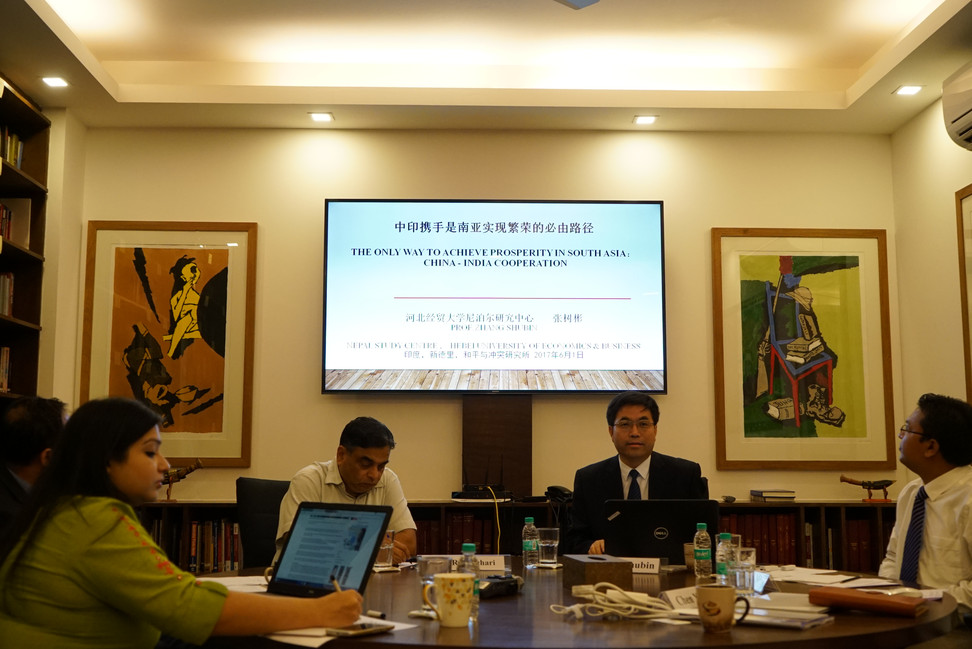2017年6月1日,河北经贸大学尼泊尔研究中心主任张树彬教授应邀赴印度首都新德里,出席由印度智库和平与冲突研究所主办的中尼印三边会议,作题为《中印携手是南亚实现繁荣的必由路径》(China - India Cooperation is the Only Way to Achieve Prosperity in South Asia)的主题发言。
新华社就此刊发消息《中国学者呼吁建立中尼印三国经济文化走廊》重点介绍了张树彬的发言要点。张树彬认为,中国西藏的冈仁波齐峰和玛旁雍错湖是印度教神山圣湖,佛祖诞生地尼泊尔的蓝毗尼(Lumbini)、释迦牟尼顿悟之处印度的菩提迦耶((Bodhgaya))、初次传法处鹿野苑(Sarnath)和涅槃处拘尸那罗(Kushinagar)都是佛教圣地,为三国构建经济文化走廊奠定了坚实的历史文化基础。中尼印铁路、公路的互联互通是南亚实现繁荣的前提。中尼印三国携手、摈弃零和思维、谋求合作共赢,应该成为三国和其他南亚国家的共同选择。他还向与会学者介绍了“一带一路”建设,呼吁专家学者为促进南亚的互联互通积极发挥作用。
和平与冲突研究所网站发布了张树彬发言摘要。

图为张树彬在作主题发言
Only Way to Achieve Prosperity in South Asia: China-India Cooperation
Zhang Shubin
Professor and Director,
Nepal Study Centre,Hebei University of Economics and Business
China’s OBOR initiative includes the silk-road economic belt and a 21st century Maritime Silk Road (MSR). It is based on three communities: of responsibility, shared interests, and destiny. The project is based on cooperation priorities such as policy coordination, facilities connectivity, unimpeded trade, financial integration and people-to-people bonds. Peace and cooperation and mutual learning and benefit are the founding ideals of the project.
The Nepal rail project is expected to be completed by 2020. In the recently announced budget, a provision of 400 million Nepali Rupees was made by the Nepalese government for the project. This is however an insufficient amount. Connectivity is a foundation of the OBOR project and is vital for the various countries to ultimately benefit from it. It is all the more important for Nepal if it intends to benefit from the OBOR initiative. Therefore, it is essential for the country to pay more attention to its rail and road links connectivity. It came as a surprise to China that the critically important China-Nepal railway project found no mention in the Kathmandu investment summit, held earlier in 2017.
China and India are the two most important member countries of the AIIB. To facilitate greater cooperation between the two, it is important to develop people-to-people communications.
The OBOR initiative is a conglomeration of various economic corridors which include the Eurasian land bridge, the China-Mongolia-Russia economic corridor, the Indo-China Peninsula economic corridor, the CPEC, the BCIM and the China-Central Asia-West Asia economic corridor. The China-Nepal-India economic and cultural corridor will add greater significance to the initiative. Buddhism forms an important cultural link between the three countries. There are approximately one hundred million Buddhists in China. Given that some of the most religiously significant sites lie in Nepal and India, an annual visit of Chinese pilgrims to these places will significantly contribute in building people-to-people contact.
The proposal for China-India-Nepal trilateralism came much before OBOR. Nepal and China signed the transit transport treaty in 2016. The OBOR initiative will be undertaken in three forms in Nepal; through China-Nepal bilateral cooperation, the BCIM project and the China-Nepal-India trilateralism initiative.
Xi Jinping talked about shared future for mankind and the OBOR initiative is a step in this direction. However for the initiative to successfully take off in South Asia, it is important for the countries to get abandon the zero-sum game mindset. Nepal should not be seen as India’s backyard and efforts should be made in developing it into South Asia’s Brussels.